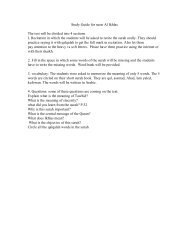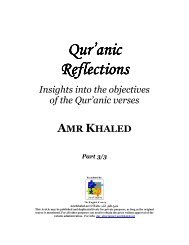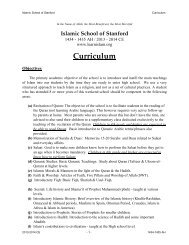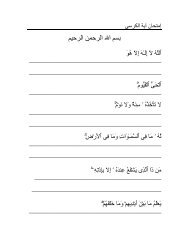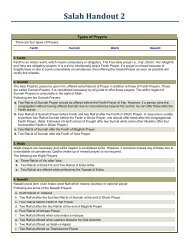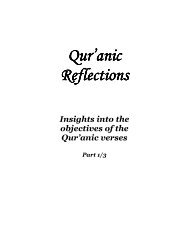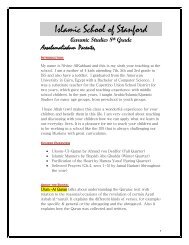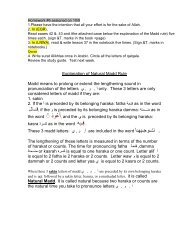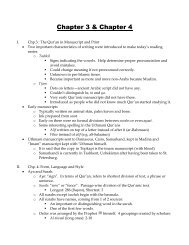Quranic Reflections - Islamic School of Stanford
Quranic Reflections - Islamic School of Stanford
Quranic Reflections - Islamic School of Stanford
Create successful ePaper yourself
Turn your PDF publications into a flip-book with our unique Google optimized e-Paper software.
You consider it a little thing, while for Allah (SWT) it was very great<br />
The Ayahs shift again to describing the gravity <strong>of</strong> the situation. Allah (SWT) says<br />
what can be translated as, “When you were propagating it with your tongues, and<br />
uttering with your mouths that where<strong>of</strong> you had no knowledge, you counted it a<br />
little thing, while with Allah it was very great; And why did you not, when you<br />
heard it, say: “It is not right for us to speak <strong>of</strong> this. Glory be to You (O Allah)!<br />
This is a great lie; Allah forbids you from it and warns you not to repeat the like<br />
<strong>of</strong> it forever, if you are believers” (TMQ, 24: 15-17).<br />
All these Ayahs are commenting on the aforementioned incident, so this was a<br />
warning to the Companions <strong>of</strong> the Prophet (SAWS), and to the whole <strong>Islamic</strong> nation,<br />
against ill speaking about women’s reputations. Some young men might say a word or<br />
make a gesture in this respect; they might even be joking without aiming at harming<br />
anybody, but the Ayahs give them a clear serious warning. Allah (SWT) says what<br />
can be translated as, “You counted it a little thing, while with Allah it was very<br />
great” (TMQ, 24: 15). The Ayahs then forbid them to repeat such an action, as Allah<br />
(SWT) says what can be translated as, “Allah forbids you from it and warns you<br />
not to repeat the like <strong>of</strong> it forever, if you are believers” (TMQ, 24: 17).<br />
Thus, we see that this story was beneficial to the society <strong>of</strong> Madinah and to all <strong>Islamic</strong><br />
societies. Let’s review together the Ayahs <strong>of</strong> this Surah and try to realize the<br />
meanings intended by Allah (SWT) in this Surah.<br />
Grave crime - strong beginning<br />
How does the Surah begin In an unconventional way. Allah (SWT) says what can be<br />
translated as, “(This is) a Surah which We have sent down and which We have<br />
enjoined, (ordained its laws)” (TMQ, 24: 1), which is a strong beginning for a<br />
Surah. However, all the Surahs <strong>of</strong> the Qur’an were revealed and enjoined, so why<br />
does this Surah begin in this style It is as if the Surah wants to powerfully protect the<br />
society, so the means <strong>of</strong> protection should be so influential so as to draw attention to<br />
the importance <strong>of</strong> the coming rules.<br />
Allah (SWT) says what can be translated as, “(This is) a Surah which We have sent<br />
down and which We have enjoined, (ordained its laws); and in it We have<br />
revealed manifest Ayat (pro<strong>of</strong>s, evidence, verses, lessons, signs, revelations -<br />
lawful and unlawful things, and set boundaries <strong>of</strong> <strong>Islamic</strong> Religion), that you<br />
may remember” (TMQ, 24: 1).<br />
What is the first <strong>of</strong> these rules<br />
Allah (SWT) says what can be translated as, “The fornicatress and the fornicator,<br />
flog each <strong>of</strong> them with a hundred stripes. Let not pity withhold you in their case,<br />
in a punishment prescribed by Allah, if you believe in Allah and the Last Day.<br />
And let a party <strong>of</strong> the believers witness their punishment” (TMQ, 24: 2).<br />
Although the basis <strong>of</strong> our religion is mercy and compassion, Allah (SWT) states in the<br />
Ayah what can be translated as, “Let not pity withhold you in their case, in a<br />
punishment prescribed by Allah”.



